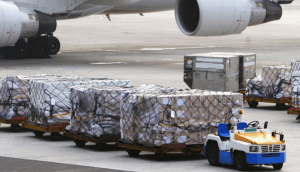
Dolly trains at a landing site.
Research with GatewayJFK and JFK International Airport analyzed the benefits of an airport-wide Truck Flow Management System to coordinate truck traffic and cargo movements throughout the airport and surrounding region. The project identified potential truck congestion and economic benefits of the airport-wide information system.
Supply chain delays stemming from the COVID-19 Pandemic greatly impacted the transportation industry, creating a logistical bottleneck that continues to impact the operations of airports, ports, carriers, shippers and third-party logistics providers.
These impacts have been felt in the Northeast Region as well, one of the busiest locations for supply chain activities in the nation. For example, according to the Port Authority’s monthly (January 2022) Air Traffic Report, JFK Airport’s cargo tonnage was 103,096 short tons, or a projected 1.25 million short tons at year’s end, ranking it #8 among US airports based on air cargo tonnage. This is in contrast to 2000, when JFK Airport cargo tonnage ranked #3 among landed weight at US airports with 1.8 million tons.
Additionally, Ocean carrier costs have jumped approximately ten times since late 2019, affecting ports, businesses, and people in the state. This means increased costs and waiting times for critical goods, materials for construction projects, and more.
A new feasibility study of the air cargo supply chain process at the John F. Kennedy International Airport makes a case for how a new, connected airport-wide Truck Flow Management System (TFMS) would streamline cargo operations for the on- and -off-airport logistics community, save time, money and fuel, and improve quality of life for residents, business owners and workers in the surrounding community.

Truck traffic in the area around the airport.
The feasibility study, JFK Cargo View: A System to Speed Truck Traffic Flow at JFK International Airport, was conducted by the Rutgers University Center for Advanced Infrastructure and Transportation (CAIT) and commissioned by GatewayJFK, a Business Improvement District representing the off-airport cargo community, a vital link in the world’s supply chain. The research was also done in collaboration with project partners Cayuga Partners, Econsult Solutions, and Farmingdale State College.
Through intelligent monitoring of the system, the JFK Cargo View report identifies new technology that would include electronic data interfaces, cargo notifications via a mobile app, paperless truck check-in and dock scheduling to improve operational efficiency and effectiveness, minimize truck wait and idling time, and reduce diesel fuel usage.
“This (the information system) includes cargo getting on and off planes, ensuring security and customs compliance, streamlining warehouse operations, and coordinating airport operations with freight forwarders and truckers to expedite the flow of export and import cargo,” said Principal Investigator Dr. Kazem Oryani. “Optimizing the cargo flow system will generate economic improvements for the local communities and businesses surrounding the airport.”
The goal of the TFMS is to improve efficiency and recoup the JFK cargo traffic lost since 9/11.
According to the Study:
- A TFMS system would reduce truck dwell time by an average of 38%.
- Truckers would be informed about when cargo, docks, forklifts and personnel are ready, optimizing both import and export sides of the cargo process.
- A TFMS would reduce truck congestion and lower the pollution impact of idling trucks. For example, CO2 emissions would be reduced each year by 80 to 512 metric tons based on the time savings scenarios outlined in the study.
- A TFMS would save an estimated $2.5-$16.0 million in direct trucking costs annually as a result of reduced man hours and fuel and operational efficiencies.
“There is a clear need for an airport-wide information system for freight forwarders (on- and off-tarmac), ground handlers and truckers to track and accurately schedule cargo pickups,” said Frank Liggio, Chair of GatewayJFK’s Board of Directors. “The Port Authority’s development plans for JFK airport cargo facilities are a significant first step; however, the pilot program currently being tested at a single facility by a single cargo handler must inform, and be part of, an integrated, airport-wide communications system for cargo,” Liggio noted.

